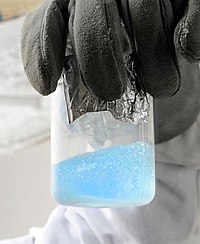
Photo from wikipedia
The self-catalyzed growth of nanostructures on material surfaces is one of the most time- and cost-effective ways to design multifunctional catalysts for a wide range of applications. Herein, the use… Click to show full abstract
The self-catalyzed growth of nanostructures on material surfaces is one of the most time- and cost-effective ways to design multifunctional catalysts for a wide range of applications. Herein, the use of this technique to develop a multicomponent composite catalyst with CoS core encapsulated in an ultrathin porous carbon shell entangled with Co, N-codoped carbon nanotubes is reported. The as-prepared catalyst has a superior catalytic activity for oxygen evolution and oxygen reduction reactions, an ultralow potential gap of 0.74 V, and outstanding durability, surpassing most previous reports. Such superiority is ascribed, in part, to the unique 3D electrode architecture of the composite, which is favorable for transporting oxygen species and electrons and creates a synergy between the components with different functionalities. Moreover, the flexible solid Zn–air battery assembled with such an air electrode shows a steady discharge voltage plateau of 1.25 V and a round-trip efficiency of 70% at 1 mA cm. This work presents a simple strategy to design highly efficient bifunctional oxygen electrocatalysts and may pave the way for the practical application of these materials in many energy conversion/storage devices.
Journal Title: Advanced Functional Materials
Year Published: 2019
Link to full text (if available)
Share on Social Media: Sign Up to like & get
recommendations!